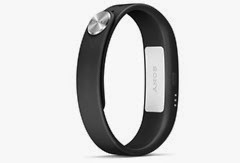 Wearing the Sony Smartband more or less every day for the last 5 or 6 weeks has got me thinking about wearables. It’s a constant reminder that my data – my activity levels (or lack thereof), my location, my sleep patterns, and more, are being tracked by this tiny little device. I’m trusting that Sony hasn’t included any backdoor into this and is tracking anything other than what they say they’re tracking, but they could be. And there are more sophisticated devices tracking body temperature, your pulse rate and lots more besides.
Wearing the Sony Smartband more or less every day for the last 5 or 6 weeks has got me thinking about wearables. It’s a constant reminder that my data – my activity levels (or lack thereof), my location, my sleep patterns, and more, are being tracked by this tiny little device. I’m trusting that Sony hasn’t included any backdoor into this and is tracking anything other than what they say they’re tracking, but they could be. And there are more sophisticated devices tracking body temperature, your pulse rate and lots more besides.
To have any utility for the Lifelog application, you have to upload your data and all of this is being stored and managed in the cloud. That means Sony knows a lot about us. And Sony is fairly new to this game – think about how much data there is courtesy of the Nike Fuelband or the Jawbone devices that are already popular and out there.
I’m not even sure what terms and conditions I’ve accepted with regards to using this device or whether it’s even possible to use the device and monitor all this activity at a local level. I’m surprised at my own ambivalence about the data privacy aspect. This is very personal health and wellness data being collected and is in the hands of corporate servers, outside of the UK and probably outside of the EU (I’m guessing the US, but I have no idea). Am I placing too much trust in Sony to keep this data safe and secure? Do they even know what they’re doing with it? I can only see some of the data as I can’t extract it to use or visualise it anywhere else. And I actually don’t know what is being collected or saved at the server level.
So three hypothetical scenarios are running through my head -
1. What if a rogue Sony employee or corporate spy were to hack into the system and extract my data? What’s the worst they could do with it? Would that impact on my life? Does it matter? In what cases does it matter?
2. What if the government got hold of the data? Would it affect my chances of getting access to specific healthcare? Would it improve or worsen the healthcare in my local area? What’s the worst that could happen if the government got hold of the data?
3. What if AN other big business got hold of the data (say through a partner data-sharing agreement)? If it’s a marketing company, how would that affect the adverts that I see or how I get communicated with? What assumptions (right or wrong) could or would be made? What if an insurance company got hold of it? Would they withhold insurance from me? Would it affect the pricing of personal health insurance?
In the first scenario, I’m not sure what the worst is that they could do except sell the data to the government or to a big business. And in the latter two scenarios, there are pros and cons of large organisations having access to this data.
The trouble is, life is complicated enough already. I have a hard time keeping up with daily life as it is. Do I want the added responsibility of having to keep up with my data life as well. Yes, I am bothered about who has my data and what they use it for. But the practicality of the matter is that I probably don’t have the time to do much about it unless there’s a crisis. By which time, it will probably be too late.
What are your thoughts on this?
Want to read my review of the smartband? You can do that here: Wearables Part 1 – Sony Smartband review
No comments:
Post a Comment
Keep it clean please. Spam will be removed. And thank you for taking the trouble to read and comment. I appreciate it.